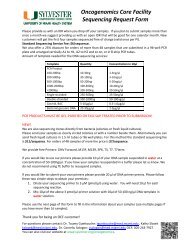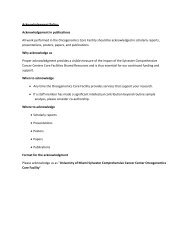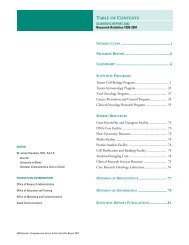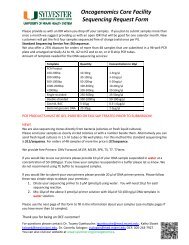SCIENTIFIC REPORT 2004 - Sylvester Comprehensive Cancer Center
SCIENTIFIC REPORT 2004 - Sylvester Comprehensive Cancer Center
SCIENTIFIC REPORT 2004 - Sylvester Comprehensive Cancer Center
Create successful ePaper yourself
Turn your PDF publications into a flip-book with our unique Google optimized e-Paper software.
C L I N I C A L O N C O L O G Y R E S E A R C H P R O G R A M<br />
Dadlani, GH, Harmon, WG, Simbre II, VC,<br />
Tisma-Dupanovic, S, and Lipshultz, SE .<br />
Cardiomyocyte injury to transplant: pediatric<br />
management. Current Opinion in Cardiology<br />
18:91-7 (Review), 2003.<br />
Adams, MJ, Hardenbergh, PH, Constine, LS,<br />
and Lipshultz, SE . Radiation-associated cardiovascular<br />
disease. Critical Reviews in Oncology/<br />
Hematology 45:55-75 (Review), 2003.<br />
BALAKRISHNA L. LOKESHWAR, PH.D.<br />
Associate Professor of Urology<br />
DESCRIPTION OF RESEARCH<br />
Dr. Lokeshwar’s research focuses on the<br />
mechanism of prostate cancer metastasis and<br />
its control by novel chemotherapeutic drugs. For<br />
the last several years, Dr. Lokeshwar’s laboratory<br />
has focused on extracellular matrix degradation<br />
and tumor metastasis. His laboratory has studied<br />
the regulation of a class of basement membrane<br />
matrix degrading enzymes called the matrix<br />
metalloproteinases (MMPs) in prostate cancer.<br />
Using cancer cell cultures established from<br />
human prostate tumor tissues obtained after<br />
prostatectomy, they showed that an imbalance<br />
exists between the levels of MMPs (overproduction)<br />
and their natural inhibitors (underproduction)<br />
in invasive prostate cancer cells. Based on<br />
this finding, they developed a hypothesis that a<br />
novel approach to control metastatic cancer is<br />
to correct the imbalance either by inhibition of<br />
secretion of MMPs or by increasing the extracellular<br />
levels of their endogenous inhibitor.<br />
Since several small synthetic inhibitors of<br />
MMPs exist, they tested the usefulness of the inhibitors<br />
using the criteria of oral bioavailability,<br />
systemic toxicity, and ability to target bone metastasis.<br />
In their search for a suitable inhibitor,<br />
Dr. Lokeshwar’s laboratory tested a series of synthetic<br />
tetracycline analogues, which were shown<br />
to possess a strong anti-collagenase activity with<br />
little or no antibiotic activity. Researchers tested<br />
eight different chemically modified tetracyclines<br />
(CMTs) and found one of them, 6-deoxy, 6-<br />
demethyl, 4-dedimethylamino tetracycline<br />
(CMT-3, COL-3, now termed Metastat R by<br />
CollaGenix Pharmaceuticals, Newtown, Pennsylvania),<br />
to be the most promising. Oral dosing<br />
with this analogue to rats and mice-bearing metastatic<br />
prostate tumors reduced tumor growth and<br />
metastasis, with no measurable systemic toxicity.<br />
Furthermore, prophylactic dosing of animals with<br />
the drug significantly reduced the incidence of<br />
tumor at the site of tumor cell injection. Their<br />
demonstration of a highly antimetastatic and antitumor<br />
activity of CMT-3 in a rat prostate tumor<br />
model led to its phase I clinical trial by the<br />
Developmental Therapeutics Program of the NCI<br />
(NCI-DTP). In the recently concluded human<br />
clinical phase I trial of CMT-3, the NCI-DTP<br />
recommended CMT-3 for phase II and phase III<br />
in patients with soft tissue sarcoma and advanced<br />
metastatic tumors. The University of Miami and<br />
the State University of New York at Stony Brook<br />
have jointly obtained a use patent on this drug.<br />
This finding also has generated a wide interest in<br />
the use of CMT-3 among many investigators<br />
within and outside the University of Miami, including<br />
a new patent issued to the University for<br />
the treatment of corneal ulceration in patients<br />
with meibomian gland disease, also called ocular<br />
rosacea. Dr. Lokeshwar’s current research focuses<br />
on identifying novel plant products that have<br />
been used as folk medicine and identifying novel<br />
combination therapies for advanced hormonerefractive<br />
prostate cancer.<br />
In a related development, COL-3 is undergoing<br />
a phase III clinical trial against HIVinduced<br />
Karposi’s sarcoma. Twenty centers<br />
nationwide are engaged in this trial, headed by<br />
Dr. Bruce DeZube of New England Deaconess<br />
Hospital, Boston.<br />
UM/<strong>Sylvester</strong> <strong>Comprehensive</strong> <strong>Cancer</strong> <strong>Center</strong> Scientific Report <strong>2004</strong> 45
















